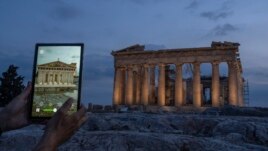15 October 2023
If you visit the Acropolis in Athens, Greece, you will see the rocky grounds high above the city that include the famous ruins of the Parthenon.
However, if you use a new app from Greece's culture ministry, you can see what the building and grounds looked like more than 2,000 years ago.
The app lets visitors see the famous place in its true glory, with the bright colors and details it had in the past. Archaeologists and other historians worked to create digital images showing how the Acropolis looked when it was new.

A man holds up a tablet showing a digitally overlayed virtual reconstruction of the ancient Parthenon temple, at the Acropolis Hill in Athens, Greece on Tuesday, June 13, 2023. (AP Photo/Petros Giannakouris)
In the app, the Parthenon, for example, has its famous marble sculptures that are now at the British Museum in London. The app lets visitors see the sculptures where they used to be near the Parthenon. Greece wants Britain to return the sculptures.
Experts say the app, called Chronos, is an example of how Artificial intelligence, or AI, technology is being used to tell the stories of the past.
The technology that expands what people can see is called augmented reality or AR. Companies such as Meta and Apple are making big investments in apps and hardware that can bring the technology to more people.
Maria Engberg recently wrote a book about the subject. She said most people will first experience augmented reality through their phones at places like the Acropolis.
She said travelers will see the technology when they take tours. They will be able to see photos and videos as they walk around historic places. Engberg is a professor at Malmo University in Sweden.
"I think we will see really interesting customer experiences in the next few years as more content from museums and archives becomes digitized," she said.
The government and other groups are making investments in AR as more visitors come to Greece following the end of the COVID-19 pandemic. Visitors to Greece in the first half of 2023 increased by over 20 percent compared to 2022, bringing over $10 billion to the Greek economy.
Microsoft worked with the Greek culture ministry to create a digital tour of Olympia, the home of the first Olympic Games. Lina Mendoni leads the agency. Earlier this year, she said the new technology lets "real visitors and virtual visitors anywhere around the world share historical knowledge."
Cosmote is the Greek telecommunications company that worked on the Chronos app. Panayiotis Gabrielides of Cosmote said advanced smart phones and faster communications networks will permit visitors to "download even higher-quality content." He said more guides and features will be available soon.
But for now, visitors can use Chronos to see how the Parthenon and other parts of the Acropolis once looked.
I'm Dan Friedell.
Dan Friedell adapted this story for Learning English based on a report by the Associated Press.
________________________________________________
Words in This Story
app –n. (application) a computer program that does a specific task often especially designed for a smart phone
glory –n. a praiseworthy condition or state
archaeologist –n. a scientist who studies the lives of ancient people
marble –n. a kind of stone often used to decorate public buildings
augmented reality –n. technology that adds to people's senses of what reality is
hardware –n. (industry specific) the physical electronic devices that use software
content –n. media such as writing, sound and pictures
digitized –adj. something in electronic form that can be used by computers
virtual –adj. existing on computers but not in the physical world